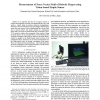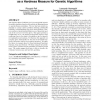1842 search results - page 53 / 369 » Measurement theory in linguistics |
IJUFKS
2000
13 years 8 months ago
2000
The concept of entropy of a discrete fuzzy measure has been recently introduced in two different ways. A first definition was proposed by Marichal [10] in the aggregation framewor...
IROS
2008
IEEE
14 years 3 months ago
2008
IEEE
—It is expected that the use of haptic sensors to measure the magnitude, direction, and distribution of a force will enable a robotic hand to perform dexterous manipulations. The...
WWW
2008
ACM
14 years 9 months ago
2008
ACM
We analyze dependencies in power law graph data (Web sample, Wikipedia sample and a preferential attachment graph) using statistical inference for multivariate regular variation. ...
CHI
2010
ACM
14 years 3 months ago
2010
ACM
This paper reports on an on-going project, which is investigating the role that location plays in the visibility of information presented on a public display. Spatial measures are...
GECCO
2007
Springer
14 years 26 days ago
2007
Springer
The Negative Slope Coefficient (nsc) is an empirical measure of problem hardness based on the analysis of offspring-fitness vs. parent-fitness scatterplots. The nsc has been teste...


